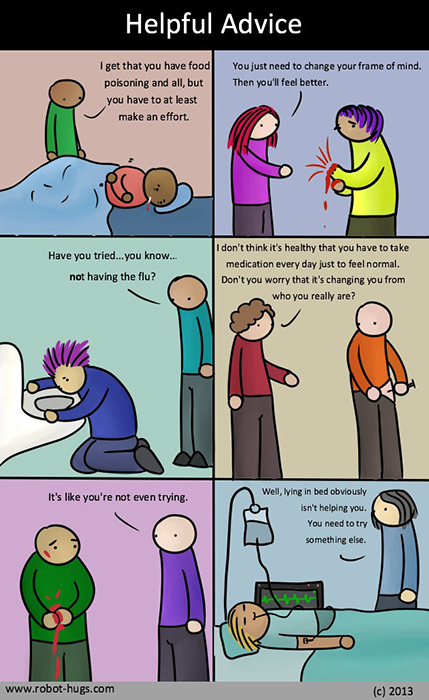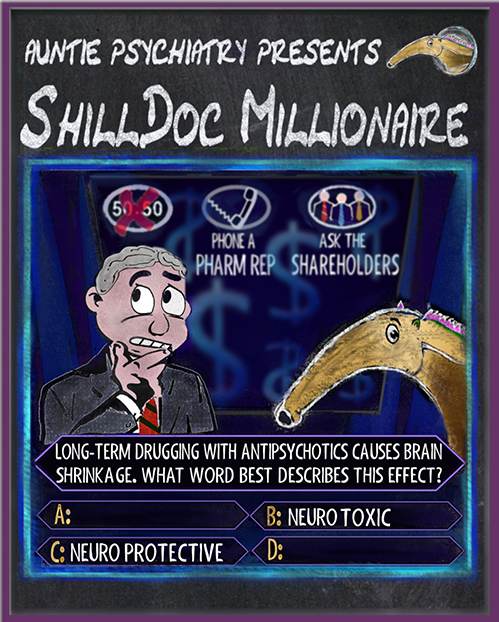A couple of years ago, I chanced upon a headline on Mad in America…
“Of Course I’m Anti-Psychiatry. Aren’t You?”
It was served up by Ted Chabasinski, and on the face of it, Ted’s challenge was not for me. My ambition at age 18 was to forge a career in psychopharmacology, and I duly set out along that firmly laid and narrow path. First step, a BSc in Pharmacology from University of Wales, Cardiff, and then straight on to a PhD at Manchester University to research movement disorders caused by neuroleptic drugs. But not far along the way, I stopped to sniff the air. Things didn’t smell right. It was the early 1990s, and this was my first whiff of the rot at the core of psychiatry.
Many years later, as I read Ted’s blog, his call to arms made perfect sense:
“If we want to change the horrible mental illness system as it is now, we have to take risks. If we are afraid to call this system what it is, why should people outside our little bubble pay any attention to us?”
 Why indeed? Over the coming days, the question of how to reach people “outside our little bubble” began to gnaw. At about the same time, a certain comic strip by Robot Hugs was making the rounds on social media, turbo-boosted by psychiatry’s celebrity pawn, Stephen Fry (yes, him). Here it is: “What if physical diseases were treated like mental illness?”
Why indeed? Over the coming days, the question of how to reach people “outside our little bubble” began to gnaw. At about the same time, a certain comic strip by Robot Hugs was making the rounds on social media, turbo-boosted by psychiatry’s celebrity pawn, Stephen Fry (yes, him). Here it is: “What if physical diseases were treated like mental illness?”
… and it went down a storm. “Spot on! Simply brilliant! SO true!”
Robot Hugs had cracked it. Deliver your message by cartoon and everybody will lap it up — even the ever-so-clever. Cartoons can have a weird, mesmeric effect on people. A good cartoon will punch through like nothing else, and what is more, people really seem to trust them. What struck me most about this cartoon was the universally credulous response. It generated an awful lot of tweets and media coverage, but I don’t recall anyone who said, “hold on a minute here…”
Step forward Auntie Psychiatry
And so, with the Robot Hugs cartoon chafing on my nerves, and Ted’s words echoing round my mind — “Of course I’m anti-psychiatry. Aren’t you?” — my imagination kicked in and a new alter ego began to form. A creature with an elongated snout, tenacious spirit and ferocious foreclaws, all fired up and ready to rip gaping holes in psychiatry’s monstrous facade.

But how did I get here? What turned me from loyal acolyte into fearsome-clawed rebel, itching to take on the high priests of psychiatry? Well, there is nothing like being given a taste of psychiatry’s vile medicine for igniting the revolutionary furnace and getting it glowing white hot.
Ruptured Life
In my early 20s, my sense of self began to disintegrate. Slowly at first, then rapidly accelerating until gravity could no longer hold me. Tectonic plates were shifting, universal truths were being revealed to me, and I felt that I was able to ‘see’ clearly for the very first time. That’s how I came to be placed in the care of skilled professionals at the best specialist psychiatric facility in the region. Exposed and vulnerable, I looked to them to help me track down the pieces of my shattered self, put them back together, and offer me a kindly, steadying hand along this precarious, rocky stretch of my life’s path.
The ‘safe and effective’ treatment I received at their expert hands left me pole-axed and gasping, like a goldfish tipped from its bowl. Emerging from the psych ward to a life where just about everything had been stripped away — career, friends, daily routine, self-confidence, social role — I groped my way from day to day, glazed and unresponsive. My conscious brain was no help at all — I had no way of explaining to myself, or anyone else, what I had been through — but some part of me knew exactly what had happened: Psychiatry had rolled up its sleeves and taught me a lesson. And it was a lesson I wouldn’t forget… I sure as hell would never go back for more.
But despite the vow I made to my battered inner self that I wouldn’t ever risk another evidence-based pummelling, I had placidly swallowed the medical line that I was doomed to a life of incurable and progressive brain disease. Psychiatry’s worldview of diagnosis, disorder, medication and malfunctioning brain circuitry was the only show in town, it was all I had ever known, and I never once stopped to question it. As the weeks and months stretched into years, the impossibility of separating my ‘self’ from the ‘disease’ took its toll, and the passivity solidified into intractable despair.
Recovery begins with non-compliance
It was in this fugged-up, listless state that I stumbled onto the nascent internet and straight into the e-community ‘Madness’ set up by Sylvia Caras. Billed as a safe space for “people who experience mood swings, fear, voices and visions,” it seemed a promising place to explore, but little did I know that this band of Mad Pride and anti-psychiatry activists would take me gently by the hand and turn my world around.
Spending time in their company, I began to feel the life force returning to my body and mind. Psychiatry had got it WRONG! Dead wrong! I wasn’t ‘ill’ at all… I was MAD! Mad as blazes. And for a time, I became one of them — a mad movement resistance fighter, an anti-psychiatry activist — it was just what the doctor ordered.
They taught me this slogan: “Recovery begins with non-compliance.” And I recognised instinctively the true meaning and power of these simple words. Within the stifling confines of mental health care, ‘non-compliance’ and ‘medication non-adherence’ are used synonymously, but in reality, non-compliance is about something far more elemental — it is a healthy act of human resistance, an urge to reassert autonomy, to fight for self-determination, to kick against the powers-that-be.
The years steamed by, my fledgling career prospects rapidly receding in the rear-view mirror to become a speck on the horizon, then gone. New and unexpected opportunities came into view which I headed for and embraced with renewed energy and courage. Meanwhile, the Madness e-community waned, eventually disbanding as the internet mutated and ballooned into a different beast… and the anti-psychiatry fire which had flared in my veins died down and found a quiet place to lie dormant within me.
Two decades later, a cartoon anteater emerged fully formed from the rekindled embers. And so, in the guise of Auntie Psychiatry, I set out to renew my acquaintance with an old nemesis. Catching up didn’t take long.
“Why, you haven’t changed a bit!” I exclaimed in amazement.
How difficult can it be?
The business of cartooning proved to be a lot more involved than I had anticipated. Ideas and images came thick and fast, but finding ways to distil a complex and nuanced subject into a single image was no piece of cake. With time and experience my skills improved, and I had enormous fun looking at an issue from different angles and teasing out the tangles of each messy scenario. At university all those years ago, my pharmacology tutors placed great value on the art of Critical Appraisal of the Scientific Literature, and the knack of assessing a piece of research for the strength of the design, validity of the research method, and the soundness of the authors’ conclusions became second nature. I silently thanked my tutors as I gifted this knowledge to Auntie Psychiatry. Here is an example of how she used it…

Damning evidence of severe brain damage caused by long-term use of antipsychotics has been stacking up for decades, and for all that time, psychiatry’s thought leaders have freely spun the data to present a truth of their own. The knowledge I picked up from my truncated research career, and my own brief exposure to Haldol in the 1990s, gave me forewarning to steer the hell clear of ‘antipsychotics.’ A lucky escape? I can’t help but feel that had I followed doctor’s orders and stuck to the prescribed treatment regimen, I would’ve ended up a long way distant from this happy vantage point.

What does it mean to be anti-psychiatry?
It’s a puzzle that has occupied me for some time, although not everyone struggles to find an answer. Professor Allan Young, chair of the Psychopharmacology Special Committee, Royal College of Psychiatrists, recently commented for an article on anti-psychiatry by the BBC:
He considers anti-psychiatrists outliers, calling them “a mixed bag of diverse groups” encompassing everyone from “’flat earth’ types with odd ideas about health to, at the other end, psychiatrists and other mental health professionals”.
I love the way Allan Young sets out his continuum of ‘anti-psychiatrists’ — flat-earthers at one end, mental health professionals at the other, all tarred together with the same anti-psychiatry brush. The lively debate around the distinction between critical psychiatry and anti-psychiatry is familiar to readers of Mad in America, but psychiatry’s heavyweight opinion leaders tend not to concern themselves with such niceties. Indeed, ‘flat-earther’ is a favoured insult lobbed at those who make inroads into discrediting their corrupt narrative, the implication being that the dominion of science belongs to them, and any outsider raising concerns can be dismissed as ‘anti-science.’ It is a powerful weapon, easily grasped by others and readily dispersed via mainstream and social media.
Ironic, then, that my background in science has equipped me with the grounding and confidence to tackle psychiatry head on, and advance a different understanding of anti-psychiatry to people who live beyond the confines of “our little bubble.” My hope is that Auntie Psychiatry will rattle round the internet for years, popping up in unexpected places to challenge psychiatry’s wall-to-wall disinformation. If you see her around, do give her a thumbs up…















Definite thumbs up from here.
Psychiatry needs a heck of a lot of more deserters than it’s got. Who knows? Your bad day could last decades….and that certainly would not be the greatest fate in the world, now would it? With a lot of help from psychiatry, of course.
MLK praised maladjustment to war, poverty, cruelty, etc. Psychiatry would adjust you to such things. Let’s hear it for maladjustment! The killing world of killing psychiatry can gloat over its ‘can of worms’ somewhere else for a change!
Congratulations over the publication of your comic. I hope it goes some ways towards educating and, thus, redeeming a few people from the abject horror and absolute waste of perpetual and demeaning, not to mention damaging, psychiatric treatment.
Report comment
On a more personal level, psychiatry would encourage a woman to adjust to emotional abuse by taking pills to numb her. Psychiatry enables abusive relationships. And no one realizes this.
Report comment
This is a very funny, very creative, and potentially very effective way to help dispel biological psychiatry’s harmful lies. I may have some ideas for future cartoons: One could be a new client asking a psychiatrist how he knows that the client has a lifelong illness – does he have a crystal ball? Meanwhile, the psychiatrist is looking into a crystal ball, and seeing one image of himself with a packed waiting room full of zombified clients, and another image of himself on a private yacht or airplane. Another could be an assembly-line of young children coming in by conveyor belt into a pediatrician or child psychiatrist’s office, and an assembly-line of young adults who are zombified and who still appear/behave like young children (maybe playing a handheld video game console?) coming out by conveyor belt through the other end of the office, which is actually a factory. Maybe we can team up?
Report comment
Lawrence, Those are great images, especially the crystal ball. One thing I have discovered is that ideas and images frequently bubble to the surface, but the tricky bit is working them into a coherent cartoon narrative – it can be very frustrating and a lot of promising material falls by the wayside – the thing that drives me is the burning need to get my message across.
I’m taking a break from cartooning right now, but my biggest wish is to encourage others to find their own creative way to get the message across… not just through cartooning, but all kinds of art. Fancy giving it a whirl? If you want to know more about the way I put my cartoons together, please feel free to drop me an e-mail.
Report comment
My way of getting the message across is by writing. I had two articles published on this website, on August 1 and 9. I plan to submit another one next week on how psychiatry ruins the lives of normally immature children by declaring they have permanent brain diseases (ADHD and bipolar). This label leads to the stifling of their upbringing by parents and schools, which is replaced by daily “tranquilizer darts” and coddling school accommodations. They resultingly never mature, and never learn skills needed to cope as adults. The only coping tool they do learn is how to numb their minds with chemicals, which makes them vulnerable to drug addiction as teenagers/adults. This is why we have a heroin epidemic in the U.S. I have data to support that this is what happens to many of these kids. I thought if you could make a cartoon of one or both of those images, then I could submit my article, illustrated by your drawing(s), and maybe our working as a team could reach more people than either of us by ourselves would.
Report comment
Congratulations! I can’t vote you up like on Disqus or I would.
Report comment
Regarding the “heroin/opioid “epidemic””, as you suggest, I’m wondering how we could get the data? How many adult heroin/opiate addicts were themselves diagnosed and drugged as kids? I’m betting that TPTB do NOT want such a study done, or the statistical facts disclosed publically.
Report comment
I think I mentioned before to Auntie that her book (I already bought my copy btw) could be destined to become contraband in psych wards, and something all the inmates want to read. People visiting their incarcerated friends could give them a copy, or leave one lying around the day room for others to find.
Anyway, I can’t say enough positive stuff about this book and encourage you all to get it and see for yourselves.
Report comment
Just bought it at Amazon, Thank You oldhead . Good idea .
Report comment
Infiltrate, infiltrate…and help liberate the inmates from the asylums!
Report comment
Yes!!! Great idea and that is one way to plant ideas. Thanks to Anti too! Thanks so much.
Report comment
“Emerging from the psych ward to a life where just about everything had been stripped away — career, friends, daily routine, self-confidence, social role — I groped my way from day to day, glazed and unresponsive”.
Thank you, Auntie Psychiatry!
Report comment
Aria, It was only when writing this article that I relived this experience and realised what a truly dark time it was for me. No surprise that recent release from hospital is such a massive risk factor for suicide. My grim determination to turn my back on psychiatry brought with it the dawning realisation that I would have nowhere safe to go in a crisis – it’s either their way or stay away – a cruel dilemma.
Report comment
And this is exactly why we need more respite houses across the country. They are not abusive or controlling and expect that people staying there take the responsibility for their own needs. People can continue to go to work or school or whatever and return in the evening to the safe haven. Psych “hospitals” teach learned helplessness and put forth the attitude that the staff are the only ones who know what a person needs.
Report comment
Plus they lock you up tighter than a drum.
Report comment
It is the oddest feeling when we know, for sure, that we are not safe. And this lack of real safety and people’s choice or non-choice in how to deal with it, has become the very monster that psychiatry hides behind.
To hide behind the dead bodies is such a disgusting, cowardly thing to do, that the word “man” is not appropriate to be given to them….the term “doctor” never had a place to begin with.
Report comment
Thank you Auntie Psychiatry ! I’m a big fan of yours. I’ve been putting some anti-psychiatry memes and others on Meme Generator -Imgflip (anyone can do it for free) , under the name anonymous and rebelthecartel . I hope you succeed far beyond your expectations . Maybe even , MIA could gain even more viewers if there was a special spot on the front page , a humour section for jokes , cartoons ,memes, humorous reflections ,humorous films , that might help wake up more people out there , to the true terror the psychiatry Hoax represents .
Report comment
Fred- A humour spot on MiA? Good idea! I seem to remember there was a cartoon slot when the site was re-vamped, but it fizzled out. Maybe the remit was too narrow – I like your idea of jokes, memes, reflections, songs, short films – there’s loads of good stuff out there, and a call for fresh material would bring in all sorts.
BTW, thanks so much for buying my book – you have made my day.
Report comment
Thumbs up from me too! Might splash out on your book.
Report comment
Cheers, Bramble! You can read the first 10% for free on Amazon, which should give you some idea.
Report comment
Denial, Corruption and Deception have been three cornerstones of psychiatry as practiced by most to-date. Let’s see Reform added now. Cannabis CBD component is said to have anti-psycotic property. Researh is needed. And a natural product EMPowerplus by Canadian company True Hope is well-researched as being effective for All mental health conds and does help Bi–polar cond I contracted as result of taking SSRI antidepressants. See truehope.com for info. True cures that heal without harm are needed. And insurance needs to Cover them instead of only the brain-damaging pharmaceuticals that have left me disabled. Thank you for your article!
Report comment
While you mean well this post borders on spam. There are no “cures” for “mental health conditions” as there is no disease to begin with. Not that I want to divert the conversation.
Report comment
Cures for the iatrogenic damage from long term psych drug use might be nice.
Report comment
As explained, “Psychotherapy and Recovery turn your experience of injustice into a medical problem and a self-improvement project.”
https://www.amazon.com/Anti-Social-Family-Radical-Thinkers/dp/1781687595/ref=sr_1_1/133-7844907-9115968?ie=UTF8&qid=1502060959&sr=8-1&keywords=the+anti-social+family
Remember the experience of emotional distress is simply the personalization of the experience of injustice. Therapy and recovery are simply the turning of this back on yourself.
When you encounter therapist and people talking about “recovery” remember this.
Report comment
Bravo! Thumbs up from here, too!
What a brilliant way to get across the truth to those who are blind to it. I have thought that for some time, the most effective way to make positive changes is via the arts because while being entertained, the subconscious mind lets down its defenses, allowing truth to get in there behind the back of its gate-keeper.
When you offered this quote: “Recovery begins with non-compliance,” it made me think of my own process. I feel that mine has a more positive ring. After my seventh hospitalization in an eight year period, I was so fed up with the revolving door that I decided I would do whatever it takes to never return. And that was listening to my inner voice and being persistent with my reactions to that. One outcome was to NOT do whatever the hospital told me to do upon discharge: do not take their free medications, do not go to their outreach programs, and do not live in neighborhoods with other ex-mental patients.
Thanks again for the story, the cartoons, and en entirely creative approach to changing society.
Report comment
Don, I absolutely relate to what you are saying. Listening to my inner voice and learning to TRUST it was crucial to regaining my self belief, balance and confidence, all of which had been lost in the psych-hospital. It was the anti-psychiatry activists I met on the early Internet who helped me turn things around, and I will never forget how important they were in my life at that time. That’s why after 20 years I have returned to anti-psychiatry activism… I want to be able to do the same for others who are in the place I was all those years ago.
Report comment
Don – right! Art is the only Truth we have left.
I don’t just mean paintings and sculptures to buy and sell – but banjos and posters, speeches and knitting circles, book clubs and fiction writing, journalism and orchestration.
Any time you are compelled to put a piece of you – out into the world – to share. Even if that’s just whistling a tune, or doodling on a napkin – art is Truth.
That’s why what Auntie has done is a highest Truth. All this and actual science, too!
Report comment
Awesome. Well done. I really enjoyed your book Auntie, and I promote it whenever I can:
https://psychiatricsurvivors.wordpress.com/2017/07/22/of-course-im-anti-psychiatry-arent-you/
Report comment
Thanks, Dragon Slayer! This means so much to me. It took a long time and a lot of thought to put the book together, so hearing this is music to my ears, and I am thrilled with the review.
Report comment
Congratulations on creating such a valuable and creative form of political art that exposes Psychiatry and their entire oppressive System of “mental health.”
I believe we often underestimate the value of all forms of art as a means to expose the forces of oppression and rally people to take action. Sometimes a creative piece of artwork can reach people in a way that other forms of political exposure are unable to accomplish.
Richard
Report comment
Sure thing! Art, music, poetry, humour… bring it all on and let’s see what we can do!
Report comment
Auntie,
Nice stuff! Keep drawing it.
Report comment
Auntie Psychiatry! I just ordered your book! 🙂
Report comment
I am very happy to know that my article influenced you in the way that it did. I can’t wait to read your new book.
Report comment
Nicely done. Yes, indeed, political art and indeed art that uses humour is an important weapon.
Report comment
Just thought I’d resurrect this for at least one last time. Order your copy yet? (No I’m not getting paid.)
Report comment
Good idea. Here’s the link to order in the US: https://www.amazon.com/Course-Anti-Psychiatry-Arent-You-Illustrated/dp/0957313721/ref=sr_1_sc_1?ie=UTF8&qid=1502983588&sr=8-1-spell&keywords=auntie+psychiatrey.
Report comment
Yes, it’s hard pinning a neat little label on anti-psychiatry types and putting them all into shoe boxes.
“Mental illness” itself is nebulous when you think about it. Is it moral depravity you speak of? Uh, no. Is it a low IQ? Certainly not!
Yet they treat an SMI labeled person as a fiendishly clever villain, a moron or both. Whichever suits them at the time.
Also–as in Robot Hugs–helpless victim. The problem with that is it encourages total passivity. As soon as I mentally rejected my label, even while trapped in MI “treatment” I accepted responsibility for my behavior. That helped me feel better immediately–contrary to what NAMI and other groups had told me.
Report comment
Steven Fry’s reasoning is faulty. Is he on a lot of psych drugs?
He claims that mental illness is biological, but then differentiates between the two in the very title he chooses.
I did another spin on that lame argument on a post in the forum. NAMI and other treatment enforcers would never treat a physically sick person the way they do the already emotionally traumatized. I have a low bovine excrement threshold. Fry’s brainless arguments make me want to puke.
Report comment
Is he on a lot of psych drugs?
Fry is a model psych-patient, so yeah, no doubt he faithfully washes down the daily neurotoxins. He’s also a willing PR pawn for UK Psychiatry, although he is becoming less important to them since they hooked and reeled in the Royals, William and Harry. A couple of years ago, Fry was given star billing in a creepy BBC documentary. It’s worth watching, if only for the sinister voice-over and ominous background music which nicely sets the tone for Psychiatry’s oppressive, no-hope message. Here’s the link (see mins 42-45 for Fry in conversation with his imperious psych-doc) https://vimeo.com/155524243
Report comment
According to his website he is on (or at least he was in 2013) an SNRI antidepressant and a mood-stabiliser. http://www.stephenfry.com/2013/06/only-the-lonely/
When he was younger it was cocaine and alcohol.
Report comment
By the way, I have read Auntie Psychiatry’s book twice. I highly recommend it. Funny and thought provoking.
Way to go Auntie! Watch out for fire ants.
Report comment
Thank you so much – that is music to my ears! No worries about fire ants… I eat them for breakfast.
Report comment
I suppose we need to thank psychiatry for the insight.
Way to wake up Auntie.
I find it illuminating that someone insults by calling dissenters “flatearth types”.
Cute attempt anyway.
Report comment